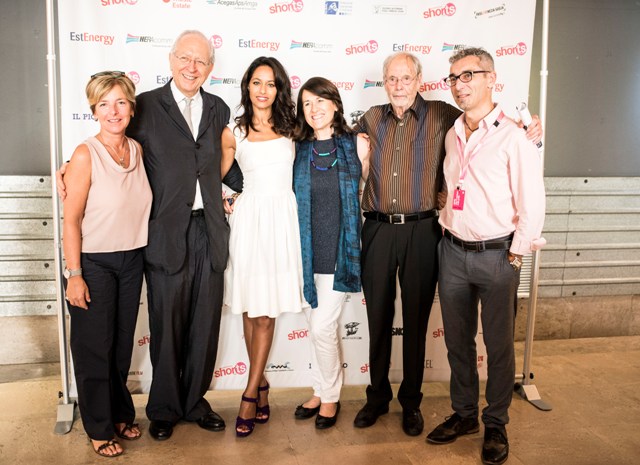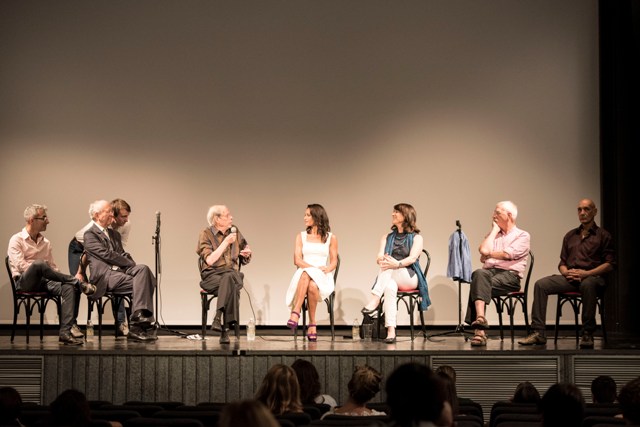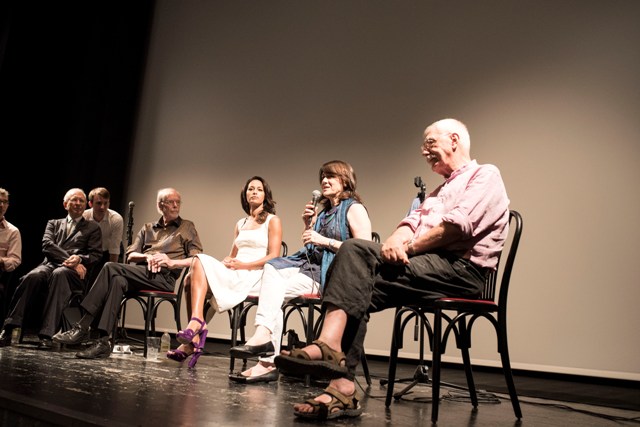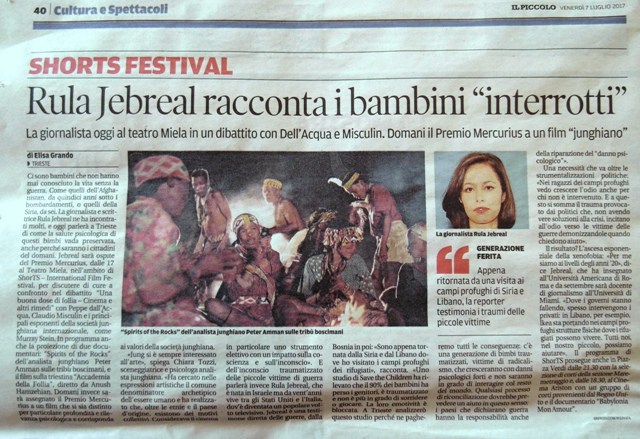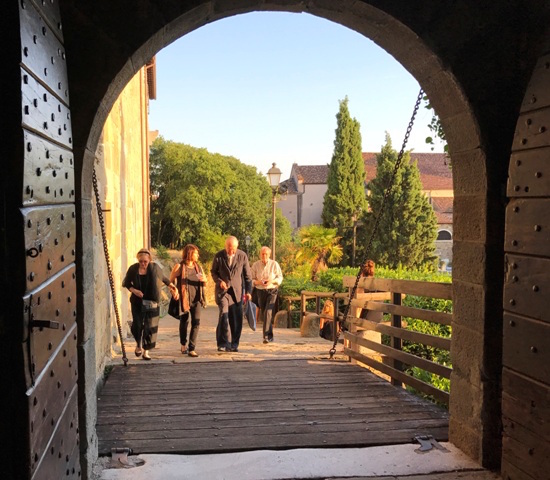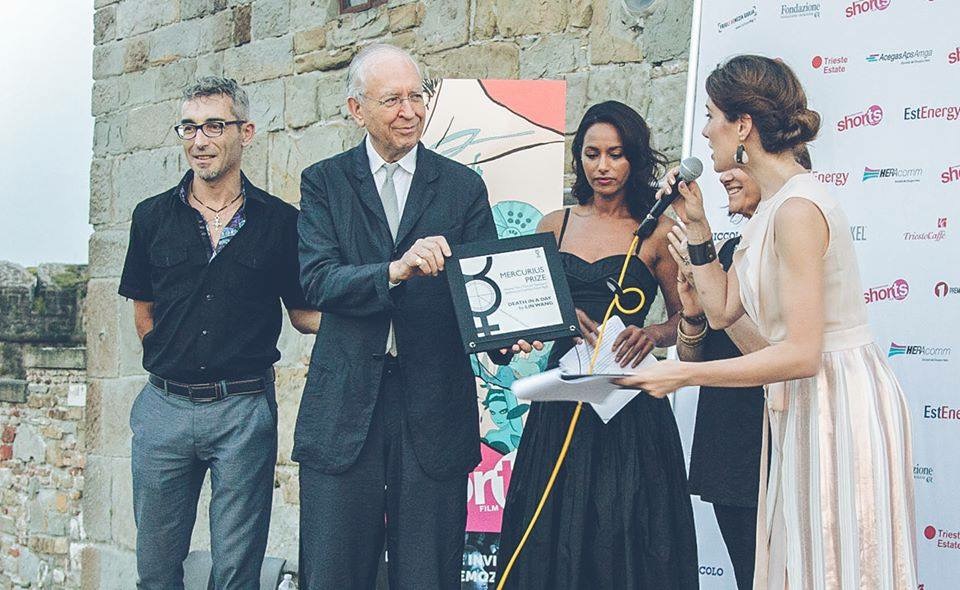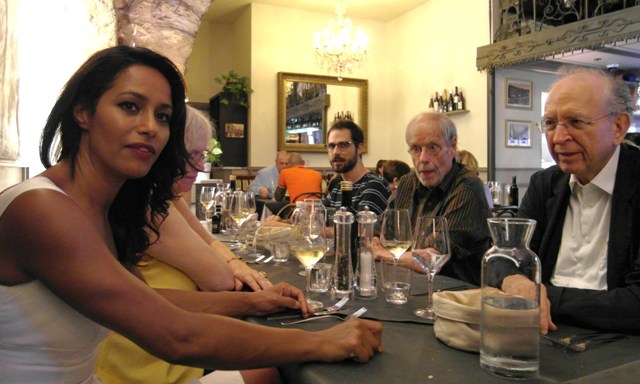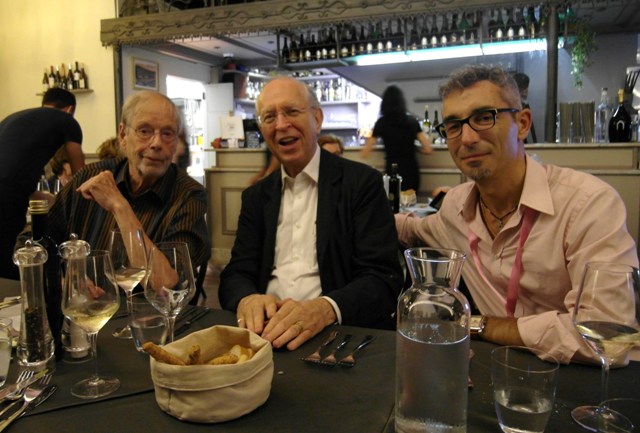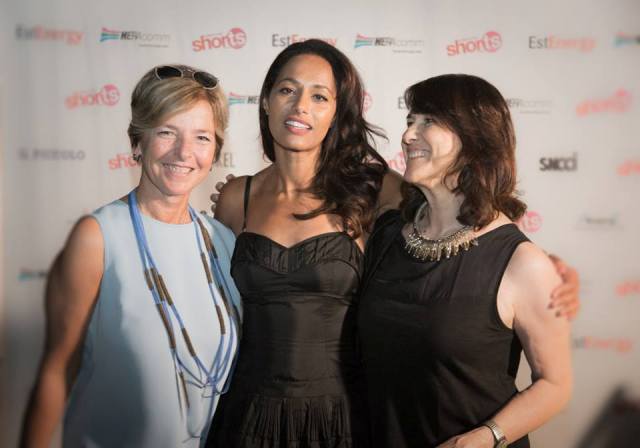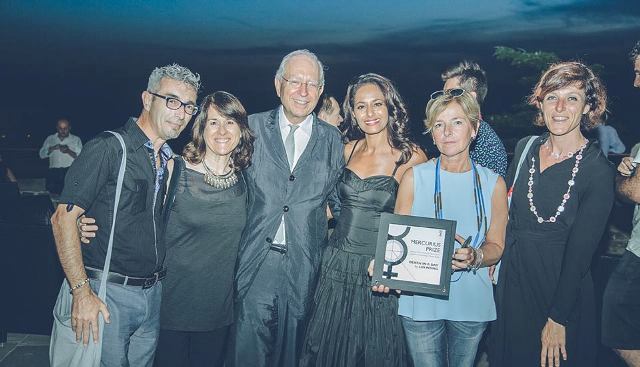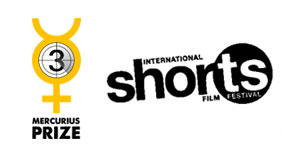
The first Mercurius Prize event will take place at the “International ShorTS Film Festival by Maremetraggio” in Trieste, Italy, July 2017. The “International ShorTS Film Festival by Maremetraggio” offers its audience high-quality works with a pan-European coverage, promoting cinema of foreign countries, young professional and inter-cultural dialogue. Starting with “International ShorTS Film Festival 2017” , the Mercurius Prize Committee later intends to offer the award in other international film festivals as well, in line with those festivals’ criteria of excellence. The Committee’s main aim is to recognize films whose qualities increase awareness of the human psyche in its largest and deepest dimensions, in accord with the aforementioned Jungian criteria.
During the International ShorTS Film Festival 2017, the Mercurius Prize Committee will confer special attention on the documentary film by Peter Ammann, “Zauberfelsen” (“Spirit of the Rocks”), a unique journey among the rock paintings in South Africa, Botswana and Namibia. This film also features the imaginal life of the Bushmen, their tales and their myths. The film is an extraordinary psychological and ethnological reflection on the creativity of the collective psyche. This first special award of the Mercurius Prize Committee will be celebrated with an evening Round Table dedicated to the topics explored in Peter Ammann’s film and to his cinematographic work as a whole, which began in the school of Federico Fellini in the 1960’s.
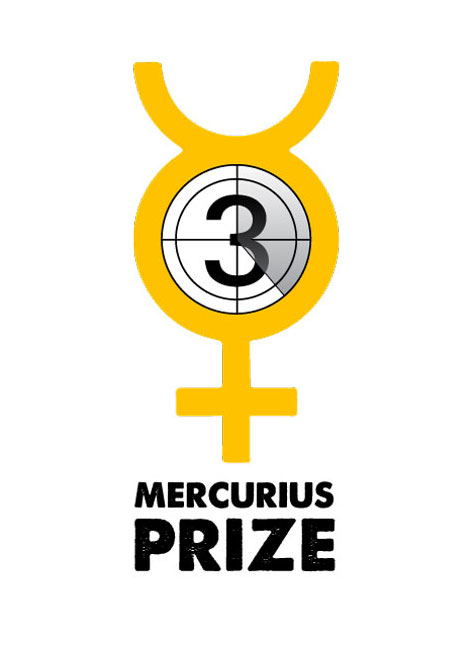
Honorary Award Statement
July 8, 2017
The Mercurius Prize Committee presents this honorary award to Peter Ammann for his film, ‘Spirits of the Rocks,’ in recognition of his contribution to deepening our understanding of the connections between ancient traditional and modern methods of psychic healing.
Peter Ammann’s film takes us on a fascinating journey into the life, the customs and the healing rituals of the ancient Bushmen, whose culture and population have been largely decimated by colonial powers. By witnessing the last representatives of the Bushmen’s culture in the territory of their ancient dwellings and by viewing their past through their beautiful rock paintings, the film provides an ethnographic glimpse into a largely unexplored tradition. With his film, Peter Ammann creatively transfers the interdisciplinary vocation of analytical psychology into a modern medium and thereby contributes to the psychological understanding and the revalorization of the values of an ancient population. For this we wish to thank the filmmaker profoundly.
Murray Stein,
President For the Mercurius Prize Committee
Mercurius Prize Committee
Munstergasse 9
8001 Zurich
Switzerland
The first Mercurius Prize awarded at the International ShorTS Film Festival “Maremetraggio” in Trieste – July 2017 – A Report
The launching of the Mercurius Prize took place in Trieste on the occasion of the International ShorTS Film Festival (1-8 July 2017). Given the high quality of its international film selection process and its capacity to promote works by young film-makers from all over the world and therefore to foster intercultural dialogue, the ShorTS International Film Festival presented a framework of particular interest and stimulating challenge to the Jury members of the Mercurius Prize Committee. The Eighteenth International ShorTS Film Festival, directed by Chiara Valenti Omero, selected 92 from the 4318 short films received from 123 countries. Beside the screening of the shorts, the International ShorTS Film Festival 2017 hosted round table discussions, didactic workshops and several different special events.
The Mercurius Prize Jury, under the chairmanship of Keith Cunningham and composed of Nathalie Boëthius-de Béthune, Nancy Swift Furlotti, Luis Moris, Giovanni Sorge, Murray Stein, Chiara Tozzi and Valentina Lucia Zampieri, viewed and assessed the 92 shorts competing in festival and engaged in the fascinating and animated experience of a discussion and joint evaluation that led to the following selection:
Alastair Cummings, John Hickman: “Akita”;
Lara-Ann de Wet: “Alive & Kicking: The Soccer Grannies of South Africa”;
Lin Wang: “Death in a Day”;
- Claude Demers: “Mon dernier été”;
Motahareh Ahmadpour: T”he Red Point – In the Name of God”;
Diana Frankovic: “The Sad Monk”;
Juanjo Giménez: “Timecode”.
After careful analysis, discussion and consideration, the Jury voted to award the Mercurius Prize to “Death in a Day,” directed by the young Chinese film-maker Lin Wang, for the extraordinary sensitivity with which the film portrayed an experience of growth and transformation through the archetypal event of death.
“Death in a Day” (2016, 35 mm.; 14mins 04secs. director and scriptwriter Lin Wang; producer: Michael Sainz & Lauren Brooks; director of photography: Matthew Tanner; Production designer: Yun Cao & Ting Jiang; Editor: Yumeng Chen; Sound Designer: Yiyang Xu; cast: Evan Liu, Wei Ren, Allen Theosky Rowe, Jun Nian Cheng) portrays, with great delicacy and refinement and playing between past and present, oneiric, real and surreal dimensions of time, the story of a 7 year-old child, Evan, who is forced to face the death of his comatose father, which is assisted by his mother in hospital. Lin Wang reports that the idea for the plot of the film arose from a long and mesmerizing dream in which she was lost in thought in front of a lake in which a group of masked men, standing just below the surface of the water, was looking back at her. Just a month later, her uncle was diagnosed liver cancer and passed away shortly thereafter. Memories started flooding back: how he taught her to swim, how he drowned himself in alcohol, how she witnessed his family being torn apart. “This film,” writes Lin Wang, “is dedicated to him, his family and all of those who struggled through his long and painful death.”
Lin Wang was born in Shanghai and comes from a family with a fine arts background. She studied in the Shanghai Theatre Academy, and after receiving a scholarship in 2010 she spent a year in New York where she shifted her focus to cinema. Her first short film, “Revenge of the Egg,” was selected for the 2011 Gotham International Film Festival. After graduating with a Master of Fine Arts Degree in Directing from Chapman University in California, she began her career directing commercials, independent short films and documentary projects in Shanghai, Tibet, Kenya and the United States. “Death in a Day” has been screened at 12 international festivals, including the Maremetraggio ShorTS Film Festival.
For the trailer of “Death in a Day” and further information about Lin Wang, see:
https://www.newfilmmakersla.com/images/program/2017/Mar/DID_PK.pdf
https://www.facebook.com/deathinaday/
The Mercurius Prize Committee was represented in Trieste at ShorTS by Murray Stein (President of the Mercurius Prize Committee), Giovanni Sorge (Vice-President) and Chiara Tozzi (Artistic Director). With them, the film-maker and Jungian analyst Peter Ammann and the journalist Rula Jebreal, as special guest, also took part in the festival.
In the spectacular setting of the San Giusto Castle in Trieste, the final award ceremony of the festival took place on the evening of the 8th of July.
For the list of the prizes, see:
http://www.maremetraggio.com/2017/07/09/shorts-2017-tutti-i-vincitori/
During the ceremony, the Mercurius Prize Committee awarded the Mercurius Prize 2017 to “Death in a Day” with President Murray Stein reading the official statement of commendation and Rula Jebreal translating into Italian:
The Mercurius Prize Committee has chosen to award its Prize to the outstanding short film, ‘Death in a Day,’ by filmmaker Lin Wang. “Death in a Day” was selected from a large field of very fine short films at the ShorTS International Film Festival in Trieste, Italy (edition 2017) because of its subtle psychological sensitivity and insight as well as for its high level of cinematic art.
Filmmaker Lin Wang shows a keen awareness of the qualities of place, context, and the “kairotic” moments that change lives forever. The film is full of fresh and surprising images and cuts that create anticipation, ambiguity, and mystery. In this way, “Death in a Day” invites us into an experience of transformation. For this special accomplishment in a short film, we have awarded “Death in a Day” the Mercurius Prize.
In the absence of Lin Wang, the prize – a commemorative plaque – was received by the director of ShorTS International Film Festival, Chiara Omero, who sent it on to the film-maker.
Inaugurating a model that will be repeated in future festivals, the Mercurius Prize Committee presented an honorary award to Peter Ammann for his film, “Spirits of the Rocks,” which was deemed a film of particular value according to the evaluation criteria of the Mercurius Prize.
For further information about Peter Ammann and a clip of the film, see:
https://www.youtube.com/watch?v=luAs9hoCeHM
“Spirits of the Rocks” (scriptwriter and director Peter Ammann, cinematography Axel Brandt, production Triluna Film AG, in coproduction with Télévision Suisse Romande, 2002) was shown on the 7th of July at the Miela Theatre to a warm and appreciative audience. The screening was followed by a panel discussion under the title of “Una buona dose di follia. Cinema e altri rimedi” (“A Good Deal of Madness. Cinema and Other Remedies”) led by Chiara Tozzi with Peter Ammann, Murray Stein, Giovanni Sorge, Rula Jebreal and the Trieste psychiatrist Peppe Dell’Acqua. The round table discussion particularly focused on the subtle and often unfathomable relationship between “madness” and mental health and on the power of cinema to symbolize such issues and to heighten the audience’s awareness of them.
It also highlighted how C.G. Jung, through his personal psychological experience that led to his famous Red Book, developed the method of the “active imagination,” a special technique – or even better: a psychological attitude – that through the practice of a wide range of expressive-creative procedures aims at overcoming psychic malaise and fostering deep psychic transformation. The discussion then moved to the anti-psychiatry movement, which had Franco Basaglia as his main exponent in Italy and still inspires the psychiatrist Peppe Dell’Acqua in his clinical and theatrical work. Dell’Acqua stressed the essentially irreducible dimension of the notion of madness and the potential of theatrical language to express, confront and possibly overcome it.
Just back from a long working stay in a Syrian refugee camp, the journalist and writer Rula Jebreal (author, inter alia, of the autobiographical novel Miral: A Novel, from which Julian Schnabel adapted his film Miral) pointed out a parallel between some contents of “Spirits of the Rocks” by Peter Ammann and the problems of colonization and consequent expropriations, both territorial and psychological. Concerning this, she emphasized the traumatic experiences lived particularly by women and children in situations of colonization and war, reporting also on some painful events she personally went through. She stressed the importance and value of artistic works that are able to tell and represent personal and collective tragedies in order not to forget and fall into a madness with no return. The representatives of the Mercurius Prize also underlined how cinema (and audio-visual art in general) can decisively contribute to the enhancement and the awareness of the transformational dynamics in therapy and in life.
Murray Stein then conferred on Peter Ammann the Mercurius Honorary Award with the following statement:
The Mercurius Prize Committee presents this honorary award to Peter Ammann for his film, ‘Spirits of the Rocks,’ in recognition of his contribution to deepening our understanding of the connections between ancient traditional and modern methods of psychic healing.
Peter Ammann’s film takes us on a fascinating journey into the life, the customs and the healing rituals of the ancient Bushmen people, whose culture and population have been largely decimated by colonial powers. By witnessing the last representatives of the Bushmen’s culture in the territory of their ancient dwellings and by viewing their past through their beautiful rock paintings, the film provides an ethnographic glimpse into a largely unexplored tradition. With his film, Peter Ammann creatively transfers the interdisciplinary vocation of analytical psychology into a modern medium and thereby contributes to the psychological understanding and the revalorization of the values of an ancient population. For this we wish to thank the filmmaker profoundly.
While thanking the Mercurius Prize Committee for the award, Peter Ammann declared himself honoured for the deep appreciation of the jury and the audience and for how the Mercurius Prize Committee, along with Rula Jebreal, acknowledged the importance of his choice to present, together with the Bushmen’s account and some traditional healing rituals, also the personal story of some western researchers and ethnologists in search of their personal and collective roots. Ammann also described the beginning of his movie career with Federico Fellini and his trajectory in documentary films, which have focused on depth psychology, political issues and immigration. In the course of his career as a Jungian psychoanalyst, he has explored and studied the correlation between traditional healing methods in Africa and modern western psychotherapy.
Resoconto della prima edizione del Mercurius Prize presso l’International ShorTS Film Festival „Maremetraggio“ a Trieste, luglio 2017
La prima edizione del Mercurius Prize si è svolta a Trieste nell’ambito dell’International ShorTS Film Festival (1-8 luglio 2017). In virtù di una selezione cinematografica internazionale di alta qualità, della sua capacità di promuovere opere di giovani film makers provenienti da diversi paesi del mondo e di favorire, in tal modo, il dialogo interculturale, Il Festival Internazionale del Cortometraggio e delle Opere Prime “Maremetraggio” rappresenta un ambito di particolare interesse e stimolo per la giuria del Mercurius Prize. Giunta alla sua diciottesima edizione, la kermesse diretta da Chiara Valenti Omero ha selezionato 92 fra i 4318 cortometraggi ricevuti da 123 paesi. Oltre alla loro proiezione, il Festival ha ospitato tavole rotonde, laboratori formativi, eventi speciali ed iniziative di vario genere.
La Giuria del Mercurius Prize , presieduta da Keith Cunningham, e formata da Nathalie Boëthius-de Béthune, Nancy Swift Furlotti, Luis Moris, Giovanni Sorge, Murray Stein, Chiara Tozzi, Valentina Lucia Zampieri ha quindi visionato ed esaminato 92 cortometraggi in concorso al Festival di Trieste e si è cimentata con l’esperienza, animata e appassionante, di una discussione e valutazione congiunta che ha portato alla seguente selezione:
Alastair Cummings, John Hickman: “Akita”;
Lara-Ann de Wet: “Alive & Kicking: The Soccer Grannies of South Africa”;
Lin Wang: “Death in a Day”;
- Claude Demers: “Mon dernier été”;
Motahareh Ahmadpour: “The Red Point-In the Name of God”;
Diana Frankovic: “The Sad Monk”;
Juanjo Giménez: “Timecode”:
In seguito, grazie a un’ulteriore analisi, discussione e votazione conclusiva, la giuria ha conferito il premio Mercurius a “Death in A Day” della giovane regista cinese Ling Wang, per la straordinaria sensibilità con cui ha raccontato un’esperienza di trasformazione e crescita di fronte all’evento archetipico della morte.
Death in a Day (2016, 35 mm.; 14mins 04secs., scritto e diretto da Lin Wang; produzione: Michael Sainz & Lauren Brooks; direttore della fotografia: Matthew Tanner; scenografi: Yun Cao & Ting Jiang; editor: Yumeng Chen; tecnico del suono: Yiyang Xu; cast: Evan Liu, Wei Ren, Allen Theosky Rowe) descrive, con estrema delicatezza e sensibilità giocando tra passato e presente, onirico, reale e surreale, la storia di un bambino di 7 anni, Evan, costretto a confrontarsi con la morte del padre, assistito fino all’ultimo, mentre era in coma, dalla madre in ospedale. Lin Wang riferisce che il cortometraggio ha preso ispirazione da un sogno in cui ella si trovava davanti a un lago e veniva osservata da un gruppo di uomini mascherati, in piedi sotto la superficie dell’acqua. Un mese dopo a suo zio venne diagnosticato un cancro che, di lì a poco, lo uccise. La regista era legata allo zio, che le aveva insegnato a nuotare e che in seguito era stato progressivamente risucchiato nel tunnel dell’alcolismo. Il film, scrive Lin Wang, “è dedicato a lui, alla sua famiglia e a tutti coloro che hanno sofferto confrontandosi con la sua lunga e dolorosa dipartita”.
Lin Wang è nata a Shanghai e proviene da una famiglia che le ha trasmesso la passione per le arti. Ha studiato presso la Shanghai Theatre Academy e nel 2010, grazie a una borsa di studio, ha trascorso un anno a New York iniziando a dedicarsi al cinema. Il suo primo cortometraggio “Revenge of the Egg” (2011) è stato incluso nella selezione ufficiale del Gotham International Film Festival. Dopo aver ottenuto un master in Fine Arts Degree in Directing alla Chapman University in California, ha diretto cortometraggi commerciali e indipendenti e realizzato documentari di vario genere in Cina, Tibet, Kenya e negli Stati Uniti. “Death in a Day” è stato finora proiettato in 12 festival – oltre a dell’International ShorTS Film Festival di Trieste.
Per il trailer di “Death in a Day” e per ulteriori informazioni su Lin Wang:
https://www.newfilmmakersla.com/images/program/2017/Mar/DID_PK.pdf
https://www.facebook.com/deathinaday/
A Trieste, il Comitato del Mercurius Prize è stato rappresentato da Murray Stein (Presidente), Giovanni Sorge (Vicepresidente) e Chiara Tozzi (Direttore Artistico). Insieme a loro ha partecipato al Festival Peter Ammann e, in qualità di ospite straordinario, la giornalista Rula Jebreal.
La sera dell’8 luglio, nella spettacolare cornice del Castello di San Giusto a Trieste, si è svolta la cerimonia di premiazione del Festival. Per la lista dei premi v. http://www.maremetraggio.com/2017/07/09/shorts-2017-tutti-i-vincitori/
Durante la cerimonia, il Comitato del Mercurius Prize ha conferito ufficialmente il Mercurius Prize 2017 a “Death in a Day” di Lin Wang. Il Presidente Murray Stein ha dato lettura della motivazione:
“Il Comitato Mercurius Prize ha scelto di aggiudicare il suo Premio all’eccezionale cortometraggio “Death in a Day” della regista Lin Wang. “Death in a Day” è stato selezionato da un’ampia serie di ragguardevoli cortometraggi in concorso allo ShorTS International Film Festival di Trieste (edizione 2017) in virtù della sua sottile sensibilità e intuizione psicologica come pure della sua eccellente qualità cinematografica.
La regista Lin Wang dimostra una spiccata consapevolezza delle qualità relative al luogo, al contesto e ai momenti “kairotici” capaci di tramutare definitivamente l’esistenza. Il film è ricco d’immagini fresche e sorprendenti oltre che di tagli capaci di creare anticipazioni, ambiguità e mistero. In tal modo, “Death in a Day” ci permette di sperimentare un’esperienza di trasformazione. Per aver saputo brillantemente realizzare tutto ciò in un cortometraggio, abbiamo conferito a “Death in a Day” il Mercurius Prize.
In assenza di Lin Wang, il premio – ovvero una targa commemorativa – è stato ricevuto dalla Direttrice di ShorTS International Film Festival, Chiara Omero, per poi essere inviato alla regista.
Il Comitato del Mercurius Prize, inaugurando un modello che intende reiterare nei prossimi festival, ha inoltre conferito un premio onorario a “Spirits of the Rocks” del regista svizzero e analista junghiano Peter Ammann, in quanto film di particolare valore ai sensi dei criteri valutativi del Mercurius Prize.
Per informazioni su Peter Ammann e un estratto del film v.:
https://www.youtube.com/watch?v=luAs9hoCeHM)
“Spirits of the Rocks” (2002; 35mm, 78min.; scritto e diretto da Peter Ammann; fotografia: Axel Brandt: suono: Dieter Meyer; musica: Richard Wolfson; produttore: Rudolf Santschi; produzione: Triluna Film AG in coproduzione con: Radio-télévision suisse romande) è stato proiettato il 7 luglio al teatro Miela incontrando calorosi apprezzamenti. Alla proiezione ha fatto seguito una tavola rotonda dal titolo “Una buona dose di follia. Cinema e altri rimedi” condotta da Chiara Tozzi con la partecipazione di Peter Amman, Murray Stein, Giovanni Sorge, Rula Jebreal e dello psichiatra triestino Peppe Dell’Acqua .
In particolare si è discusso delle sottili e spesso indefinibili relazioni tra la salute mentale e la cosiddetta “follia” e della capacità dell’arte cinematografica di esprimere simbolicamente tali tematiche aumentando la consapevolezza degli spettatori; a questo proposito è stato evidenziato come C.G. Jung, attraverso la sperimentazione psicologica che lo portò al celebre Libro rosso, sviluppò il metodo della ‘immaginazione attiva’: una speciale tecnica, o meglio ancora attitudine psicologica, che attraverso l’impiego di una vasta rosa di modalità espressivo-creative mira a superare il disagio psichico e favorire una trasformazione psichica profonda. Si è fatto poi riferimento al movimento dell’antipsichiatria, che in Italia ebbe in Franco Basaglia il suo principale esponente, e a cui si ispira il lavoro clinico e teatrale dello psichiatra Peppe Dall’Acqua. Questi ha rilevato la sostanziale irriducibilità della nozione di follia e le potenzialità del linguaggio teatrale come veicolo di espressione, confronto e possibile superamento del disagio psichico. La giornalista e scrittrice Rula Jebreal (autrice fra l’altro del romanzo autobiografico La strada dei fiori di Miral, da cui Julian Schnabel ha tratto il film Miral), appena rientrata da un lungo soggiorno di lavoro in un campo profughi siriano, ha rilevato una connessione fra alcuni contenuti di Spirits of the Rocks e le problematiche. sia territoriali che psicologiche, della colonizzazione e della conseguente espropriazione. Jabreal ha sottolineato l’importanza e il valore di opere artistiche capaci di raccontare e rappresentare drammi personali e collettivi, per non dimenticare – e cadere nella follia da cui non si torna. I rappresentanti del Mercurius Prize hanno infine sottolineato come l’arte cinematografica (audiovisiva in genere) possa contribuire in modo decisivo all’accrescimento della consapevolezza delle dinamiche trasformative della terapia e dell’esistenza.
Murray Stein ha quindi conferito a Peter Ammann l’Honorary Award del Mercurius Prize con la seguente motivazione:
“Il Comitato del Mercurius Prize Committee conferisce questo premio onorario a Peter Ammann per il suo film “Spirits of the Rocks”, per aver contribuito ad approfondire la nostra conoscenza delle relazioni tra antiche metodologie tradizionali di guarigione psichica e moderni trattamenti psicoterapeutici.
Il film di Peter Ammann ci accompagna in un viaggio affascinante nella vita, le usanze e i riti di guarigione dell’antico popolo dei Boscimani, la cui cultura e popolazione è stata ampiamente decimata dalle forze coloniali. Attraverso le testimonianze degli ultimi rappresentanti della civiltà dei Boscimani raccolte nella loro terra e le antiche tracce delle loro meravigliose pitture rupestri, il film offre uno sguardo etnografico in una tradizione largamente inesplorata. Con quest’opera, Peter Ammann interpreta in modo creativo la vocazione interdisciplinare della psicologia analitica attraverso un mezzo espressivo moderno, quello cinematografico, e contribuisce così alla comprensione psicologica e alla rivalorizzazione di un’antica popolazione. Al regista va dunque la nostra profonda gratitudine.”
Nel ringraziare il Comitato del Mercurius Prize per il premio, Peter Ammann si è dichiarato onorato per il profondo apprezzamento della giuria e del pubblico e per come il Comitato del Mercurius Prize, insieme a Rula Jebreal, abbia riconosciuto l’importanza della sua scelta di presentare, insieme alle testimonianze dei Boscimani e ad alcuni rituali di guarigione tradizionali, la storia personale di alcuni dei ricercatori ed etnologi occidentali, alla ricerca delle proprie radici individuali e collettive. Ammann ha inoltre raccontato degli inizi della propria carriera cinematografica a fianco di Federico Fellini; ha parlato del proprio percorso di documentarista che lo ha visto occuparsi, fra l’altro, di psicologia del profondo, di questioni politiche e immigrazione portandolo, negli anni, a esplorare la correlazione fra i metodi di guarigione della tradizione africana e la moderna psicoterapia occidentale.
